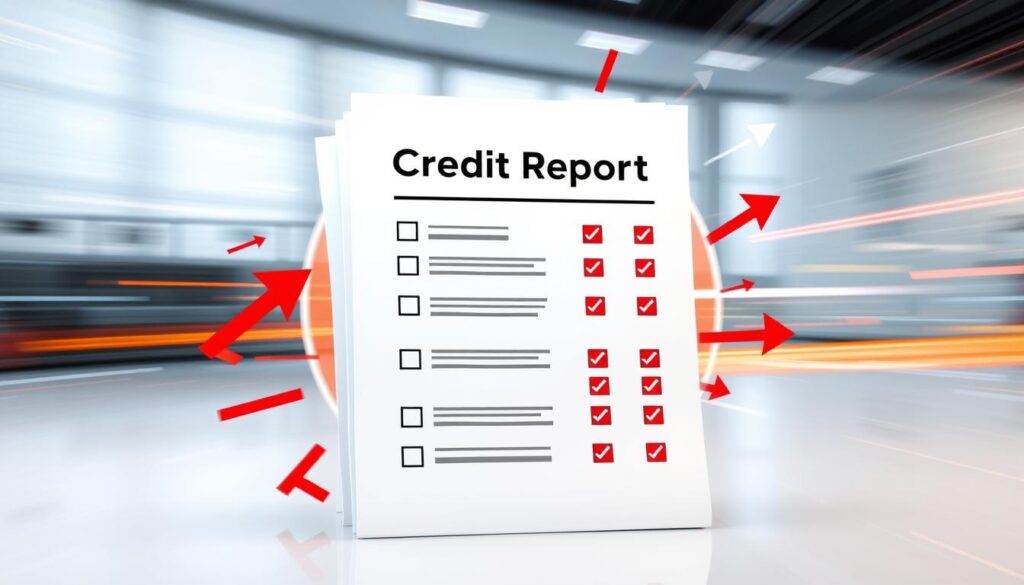Managing your credit profile is vital in today’s financial world. Unwanted credit inquiries can hurt your credit score. These inquiries may limit your chances for loans, credit cards, housing, and jobs.
Rapid inquiry deletion offers a solution to this problem. It helps remove unwanted inquiries from your credit reports. This process can improve your credit score and financial health.
This guide will teach you about rapid inquiry deletion. You’ll learn strategies to remove both hard and soft inquiries. With this knowledge, you can clean up your credit profile.
Key Takeaways
- Rapid inquiry deletion is the process of quickly removing unwanted credit inquiries from your credit reports.
- Credit inquiries, both hard and soft, can have a significant impact on your credit score and financial opportunities.
- Understanding the types of credit inquiries and their impact is crucial for effectively managing your credit profile.
- The process of rapid inquiry deletion involves gathering necessary documentation, contacting credit bureaus and lenders, and building a strong case for removal.
- Strategies for successful rapid inquiry deletion include following up persistently and monitoring your credit reports for any changes.
Understanding Credit Inquiries and Their Impact
Credit inquiries are vital in evaluating your creditworthiness. They appear on your credit report as hard or soft inquiries. Knowing the difference between these types is crucial for rapid inquiry deletion.
Types of Credit Inquiries: Hard and Soft
Hard inquiries happen when you apply for new credit. They can negatively impact your credit score. These inquiries show you’re seeking additional debt.
Soft inquiries occur during pre-approvals or account monitoring. You or a company can initiate them. They don’t affect your credit score.
How Credit Inquiries Affect Your Credit Score
Both inquiry types appear on your credit report. However, only hard inquiries can temporarily lower your score. They signal to lenders you might take on new debt.
Soft inquiries don’t impact your credit score. This makes them less concerning for rapid inquiry deletion.
| Type of Inquiry | Impact on Credit Score |
|---|---|
| Hard Inquiry | Negative impact, can lower credit score temporarily |
| Soft Inquiry | No Impact on Credit Score |
Monitoring your credit report and understanding the different types of inquiries can help you make informed decisions about your financial well-being.
When to Consider Rapid Inquiry Deletion
Unwanted credit inquiries can harm your credit report. They may result from identity theft, lender mistakes, or aggressive marketing. Removing these inquiries can boost your credit score and improve loan chances.
Look out for these signs to consider rapid inquiry deletion:
- You notice suspicious credit inquiries on your report that you did not authorize.
- You have been the target of aggressive marketing campaigns, resulting in multiple unsolicited credit applications.
- A lender or creditor has made a mistake and performed a hard credit check without your knowledge or consent.
- You are experiencing a drop in your credit score due to an excessive number of credit inquiries.
Rapid inquiry deletion offers several benefits. It can improve your credit score and open up better financial opportunities. You’ll have access to a wider range of loans, credit cards, and mortgages.
This process also helps maintain a healthier credit profile. It can prevent setbacks in your financial goals and increase your overall stability.
- Improved credit score: Removing unwarranted credit inquiries can help boost your credit score, which is essential for securing favorable loan terms and interest rates.
- Enhanced financial opportunities: With a higher credit score, you’ll have better access to a wider range of financial products, such as loans, credit cards, and mortgages.
- Increased financial stability: By eliminating unnecessary credit inquiries, you can maintain a healthier credit profile and avoid potential setbacks in your financial goals.
Rapid deletion of unwanted inquiries protects your credit. It’s a smart move for securing your financial future.

| Reason for Inquiry | Impact on Credit Score | Recommended Action |
|---|---|---|
| Identity Theft | Significant Negative Impact | Initiate Rapid Inquiry Deletion |
| Lender Error | Moderate Negative Impact | Dispute and Request Removal |
| Aggressive Marketing | Mild Negative Impact | Consider Rapid Inquiry Deletion |
Knowing the signs of unnecessary credit inquiries is crucial. Understanding rapid inquiry deletion benefits helps protect your credit. Take action to safeguard your financial well-being.
The Process of Rapid Inquiry Deletion
Removing unwanted credit inquiries from your report can boost your credit profile. Rapid inquiry deletion involves gathering documents and contacting credit bureaus and lenders. Follow these steps to successfully delete inquiries and improve your credit standing.
Gathering Necessary Documentation
Start by collecting documents to support your case. You’ll need copies of your credit reports highlighting inaccurate inquiries. Gather evidence of errors, like billing statements or lender correspondence. Prepare detailed explanations for why inquiries should be removed.
- Copies of your credit reports, highlighting the inaccurate or unauthorized inquiries
- Evidence of any errors or unauthorized activities, such as billing statements or correspondence with the lenders
- Detailed explanations of why the inquiries are inaccurate or should be removed
Contacting Credit Bureaus and Lenders
Next, reach out to credit bureaus (Experian, Equifax, and TransUnion) and the lenders responsible for inquiries. Submit written disputes to credit bureaus, clearly outlining issues with supporting documentation.
Contact lenders who made inquiries and ask them to remove them from your report. Follow up consistently with both parties to ensure successful deletion of inquiries.
- Submitting written disputes to the credit bureaus, clearly outlining the issues and providing the supporting documentation
- Communicating with the lenders who made the inquiries, requesting that they remove the inquiries from your credit report
- Persistently following up with both the credit bureaus and lenders to ensure the inquiries are successfully deleted
Rapid inquiry deletion takes time and may require multiple communications. Stay organized and persistent. With proper documentation, you can effectively remove unwanted inquiries and boost your credit profile.
Strategies for Successful Rapid Inquiry Deletion
Rapid inquiry deletion needs a smart plan. Build a solid case and follow up with credit bureaus and lenders. Gather proof and show why inquiries are wrong or unauthorized.
Building a Strong Case
First, find the credit inquiries you want removed. Check your credit report for evidence of unauthorized or inaccurate inquiries. Collect supporting documents to back up your claim.
Organize your proof carefully. Be ready to present a clear, well-supported case to credit bureaus.
Following Up Persistently
Rapid inquiry deletion often requires multiple talks with credit bureaus and lenders. Stay persistent and track your case’s progress. Make sure inquiries are removed quickly and correctly.
Be ready to escalate if needed. Use your rights under the Fair Credit Reporting Act (FCRA) to get results.
Use these strategies for rapid inquiry deletion to take charge of your credit profile. Build a strong case and follow up with credit bureaus. Persistence in the deletion process is key to rapid inquiry deletion.

Rapid Inquiry Deletion
Rapid inquiry deletion efficiently removes unwanted credit inquiries from your report. This process helps you take control of your credit profile. By implementing effective strategies, you can improve your overall financial health.
Start by gathering the necessary documentation. Get copies of your credit reports from Experian, Equifax, and TransUnion. Identify the specific inquiries you want removed.
Then, contact the credit bureaus and lenders directly to dispute inaccurate inquiries. Use written letters, phone calls, or online dispute portals. Provide supporting evidence to strengthen your case.
| Credit Bureau | Contact Information |
|---|---|
| Experian | 1-888-397-3742 |
| Equifax | 1-800-685-1111 |
| TransUnion | 1-800-916-8800 |
To boost your chances of success, build a strong case. Gather evidence and document the timeline of events. Outline clear reasons why the inquiries should be removed.
Follow up persistently with credit bureaus and lenders. This ensures your request is addressed quickly. Stay on top of the process for best results.
Rapid inquiry deletion can expedite the removal of credit inquiries. It also enables fast credit report updates. These actions can improve your credit score and financial standing.
Preventing Future Unnecessary Credit Inquiries
Keep your credit profile healthy by taking proactive steps. Manage your credit applications carefully. Watch your credit report for strange activities. Know your rights under the Fair Credit Reporting Act.
Reduce the number of credit applications you submit. Each application adds a hard inquiry to your report. This can hurt your credit score. Research and compare offers before applying.
Only apply for credit you’re likely to get approved for. This strategy helps avoid unnecessary inquiries. It also protects your credit score from potential damage.
Check your credit report often. This helps you spot unauthorized credit inquiries or suspicious activities. You can get free reports yearly from Experian, Equifax, and TransUnion.
Regularly monitoring your credit report is essential for preventing future unnecessary credit inquiries and maintaining a healthy credit profile.”
Take steps to reduce credit applications and monitor your credit report. This helps prevent future credit inquiries. It also keeps your credit profile strong. You’ll need fewer rapid inquiry deletions in the future.
| Action | Benefit |
|---|---|
| Reduce credit applications | Fewer hard inquiries on your credit report |
| Monitor your credit report | Identify and address unauthorized inquiries |
| Understand your FCRA rights | Know how to dispute and remove inaccurate information |

Understanding Your Rights as a Consumer
Knowing your consumer rights is vital for protecting your finances. The Fair Credit Reporting Act (FCRA) and Consumer Financial Protection Bureau (CFPB) are key organizations safeguarding these rights.
Fair Credit Reporting Act (FCRA)
The FCRA is a federal law that protects your credit reporting rights. It allows you to dispute inaccurate information on your credit report.
You can access your credit report for free under the FCRA. This law ensures you can check and maintain the accuracy of your credit information.
Consumer Financial Protection Bureau (CFPB)
The CFPB is a government agency that protects consumers in the financial sector. They offer resources to help you understand the credit reporting system.
The CFPB guides you through credit report disputes and credit inquiry regulations. Their support empowers you to safeguard your financial well-being.
Understanding your consumer rights helps you maintain an accurate credit profile. This knowledge empowers you to make smart financial decisions and secure your financial future.
Working with Credit Repair Professionals
Rapid inquiry deletion can be overwhelming. A credit repair professional can help navigate the complex credit reporting system. They can gather documents and communicate with credit bureaus to remove unwanted credit inquiries.
A credit repair service offers many benefits:
- In-depth knowledge of credit reporting laws and regulations
- Experience in identifying and disputing inaccurate, incomplete, or unverifiable information on your credit reports
- Negotiation skills to effectively communicate with creditors and credit bureaus
- Ongoing monitoring and maintenance of your credit profile
Choose a reputable credit inquiry deletion expert with a proven track record. Look for reviews, credentials, and ethical practices. Ensure they align with your credit improvement goals.
| Benefit | Description |
|---|---|
| Expertise | Credit repair professionals have in-depth knowledge of credit reporting laws and regulations, allowing them to effectively navigate the process of removing unwanted credit inquiries. |
| Negotiation Skills | These experts possess the negotiation skills necessary to communicate effectively with credit bureaus and lenders, increasing the chances of successful credit inquiry deletion. |
| Ongoing Monitoring | Credit repair services often provide ongoing monitoring and maintenance of your credit profile, ensuring that any new issues are promptly addressed. |
A reputable credit repair service can help improve your credit standing. They have the expertise to address credit inquiries effectively.

Alternative Methods for Credit Repair
There are other ways to fix your credit besides hiring professionals. You can try DIY tactics or use credit monitoring tools. These methods can help you control your credit profile and manage your finances better.
DIY Credit Improvement
Fixing your credit yourself can save money and boost confidence. You can check your credit reports, challenge mistakes, and build good money habits. This approach helps rebuild your credit without professional help.
Leveraging Credit Monitoring Tools
Credit monitoring tools offer many features to keep your credit healthy. They update your credit score regularly and warn you about suspicious activity. Some even give tips to improve your credit standing.
| Credit Monitoring Tool | Key Features | Pricing |
|---|---|---|
| Credit Karma | Free credit reports, credit score monitoring, personalized recommendations | Free |
| Experian IdentityWorks | Credit report monitoring, identity theft protection, FICO score tracking | $9.99 – $19.99 per month |
| TransUnion myVehicle | Vehicle history reports, credit monitoring, identity theft protection | $19.95 per month |
Using these alternative credit repair methods and tools can improve your credit profile. This proactive approach can help you reach your financial goals faster.
Maintaining a Healthy Credit Profile
A healthy credit profile requires diligence and responsible financial practices. Regularly monitor your credit reports and build credit responsibly. These actions ensure a strong and resilient credit profile.
Monitoring Your Credit Reports
Regularly review your credit reports to maintain a healthy credit profile. This helps identify errors that may impact your credit scores. By monitoring credit reports, you can address issues early and maintain healthy credit.
Building Credit Responsibly
Responsible credit profile management involves building credit thoughtfully. Make timely payments and keep credit utilization low. Limit the number of credit applications you submit.
Building credit responsibly establishes a strong history. It shows your ability to manage credit effectively. This approach demonstrates your financial reliability to lenders.
A healthy credit profile goes beyond a high credit score. It’s about maintaining responsible financial habits. Stay vigilant and make smart decisions to keep your credit profile in top shape.
The key to a healthy credit profile is a combination of regular monitoring and responsible credit-building practices.
Conclusion
Rapid inquiry deletion is a powerful tool for improving your credit profile. It helps you take control of your credit journey. By understanding its impact, you can achieve financial freedom.
Stay vigilant and exercise your consumer rights. Consider professional help if needed. With the right approach, you can maintain healthy credit health improvement for years.
Be proactive and persistent in your credit management efforts. Use available resources for rapid inquiry deletion summary. These are key takeaways for success.
Improving your credit profile is an ongoing process. With your new knowledge, you’re on track to achieve financial goals. Stay committed and informed about your credit health.
Take pride in your progress. Your financial future is bright. Remember, your credit health is in your hands.

